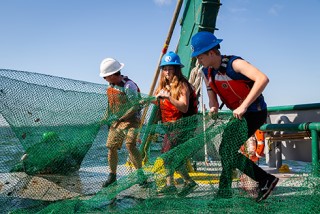Learning and Research
Overview
Outside the Classroom
From conducting archaeology excavations to going out to sea to painting murals, USF St. Petersburg provides students with hands-on knowledge and unique learning experiences. See how students learn by doing in this YouTube series.
Community Engaged Learning
USF holds the prestigious Carnegie classification as a Community Engaged University. Carnegie defines community engagement as a collaboration between institutions of higher education and their local, regional, state, national, and global communities for the mutually beneficial exchange of knowledge and resources in a context of partnership and reciprocity.
At USF St. Petersburg campus, the Center for Civic Engagement tracks community engagement through surveys, and cultivates a culture of community engagement on campus by hosting a civic engagement fair every semester, and through offering faculty professional development awards and programs.
See examples of some community-engaged learning initiatives:
- Student proposal leads to free bus rides for Pinellas County veterans
- Exploring sustainable tourism on Egmont Key through virtual reality
- Podcast series teams up Tampa Bay Times reporters with aspiring journalists
- Uncovering our community’s artifacts and stories
- Graduate students analyze historical data to inform future city planning
- Class receives award for collaboration with Innovation District
Community-Engaged Research
The USF curriculum on the St. Petersburg campus is focused on arts and sciences, business and education within a close- knit, student-centered learning community. USF faculty on the St. Petersburg campus conduct wide-ranging, collaborative research to meet society’s needs and engage in service projects and partnerships that enhance the university and the community’s social, economic and intellectual life. USF faculty’s dedication to the wider community is a strong component of the research mission. The vision is to enhance opportunities for community-based research, service, and learning; while promoting, strengthening, and supporting research as a pathway to knowledge, discovery, problem solving, and contributing to the public good. Faculty members produce an impressive body of scholarly work, creative activities and community service projects with a strong research component.
See Research at USF St. Petersburg.
See USF’s Faculty Expert Guide.
See faculty community-engaged research highlights:
- Community Resilience Information System (CRIS) for Enhancing Community Resilience
Thanks to a National Science Foundation grant, CRIS-HAZARD builds on the capabilities of the existing Community Resilience Information System (CRIS) platform, which was developed by USF researchers in partnership with AT&T and Argonne National Laboratory (ANL) to conduct rapid surveys to collect community experiences with disaster in Pinellas County, Florida. This project will combine the capabilities of CRIS developers at USF, local stakeholders, and community engagement networks, including the Pinellas County Office of Emergency Management, with the expertise of spatial planning analytics at Georgia Tech, to develop this early warning and knowledge transfer system.
Read the related news article.
- Family Study Center
The Family Study Center provides varied opportunities to enhance the workforce development efforts of Infant and Family Mental Health practitioners within our community. Training opportunities are provided through structured workshops, community presentations, and webinars to enhance identified learning themes related to infant mental health, coparenting, early childhood, and family systems
Visit the Family Study Center.
- Prevention of Alzheimer’s with Cognitive Training
Jennifer O’Brien, an associate professor of psychology on the St. Petersburg campus has for years been part of multi-university research and lab exploring the use of technology to reduce memory loss. She is part of a team that won a $44.4 million NIH grant that will study whether computerized brain training exercises can reduce the risk of Alzheimer’s disease in older adults. This is an expansion of the USF Preventing Alzheimer’s with Cognitive Training (PACT) study, which Dr. O’Brien has been leading on our campus and which seeks participants from the Tampa Bay Region to participate in the study.
